Overview:
Best practices for alcoholics with diabetes include moderating alcohol intake, choosing lower-sugar beverages, and monitoring blood sugar levels to manage their health effectively. The article emphasizes that understanding the interaction between alcohol and diabetes is crucial, as careful management can mitigate risks such as hypoglycemia and poor glycemic control, supported by research highlighting the importance of education and lifestyle modifications in achieving optimal health outcomes.
Introduction
Navigating the complexities of diabetes management involves understanding various lifestyle factors, with alcohol consumption being a significant concern. For individuals living with diabetes, the effects of alcohol on blood sugar levels can be profound and potentially dangerous. This article delves into the intricate relationship between alcohol and diabetes, highlighting the risks, effective strategies for safe consumption, and the importance of education and awareness.
With insights from recent studies and expert opinions, it aims to equip readers with the knowledge necessary to make informed decisions about alcohol intake while managing their health effectively. As the landscape of diabetes care evolves, understanding these dynamics is crucial for achieving optimal health outcomes.
Understanding the Relationship Between Alcohol and Diabetes
Alcohol consumption can profoundly influence blood sugar levels and management of the condition, a fact that newly diagnosed patients must understand as they navigate their health journey. While moderate consumption may appear harmless, it can result in hypoglycemia, especially in individuals using insulin or specific medications for blood sugar management. At&T Solutions, we are dedicated to enhancing management of health conditions related to diabetes through education and community support.
We provide resources like informational articles, webinars, and community forums to assist patients in understanding their individual reactions to spirits. Recent studies have indicated a striking 77% increase in risk for blood sugar issues associated with beverage intake (HR = 1.77, 95% CI 1.53–2.04, p<0.001), underscoring the need for caution. Alcohol interferes with gluconeogenesis—the liver's process of producing glucose—resulting in unpredictable fluctuations in blood sugar levels.
This effect is worsened when drinking takes place on an empty stomach, making it crucial for alcoholics with diabetes to pair beverages with food to reduce risks. As Dr. Mary Ann Emanuele, M.D., emphasizes, 'Understanding how spirits interact with blood sugar medications is vital for maintaining optimal glucose control.' Furthermore, while the meta-regression suggested no influence of dosage and duration on results, the limited number of studies may have hindered the detection of such influences.
Thus, patients should remain vigilant about their beverage consumption and its potential consequences on their diabetes management. T2DSolutions will continue to provide resources and support, including personalized guidance and community connections, to help them navigate these challenges effectively.
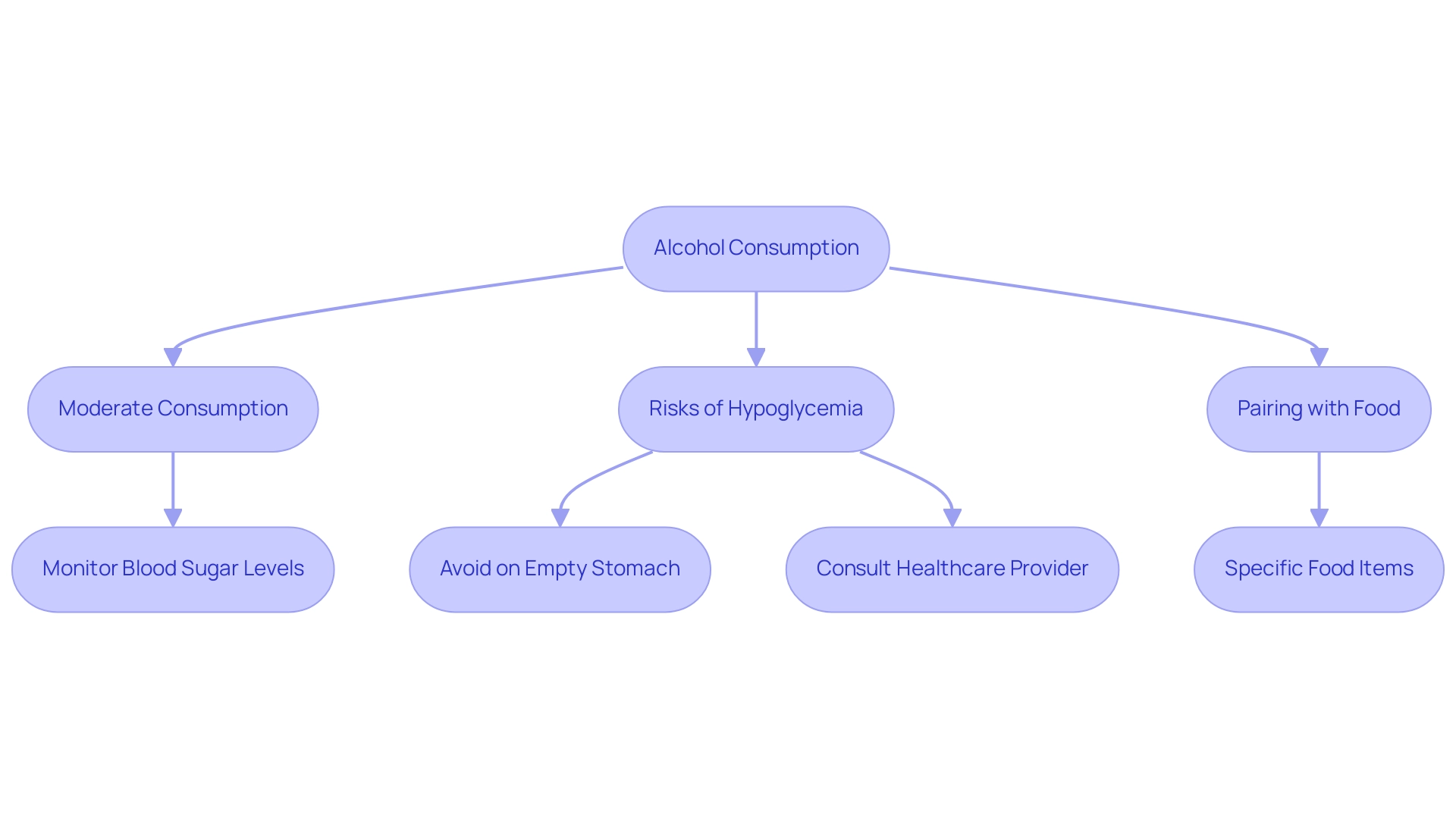
Effective Strategies for Safe Alcohol Consumption in Diabetics
For alcoholics with diabetes, safely consuming beverages requires adherence to several key strategies, which will be integral to the resources offered by T2DSolutions. First, it is important to opt for beverages with lower sugar content. Suitable choices include light beer, dry wine, or spirits mixed with calorie-free mixers.
Monitoring blood sugar levels before and after consumption is crucial for alcoholics with diabetes to understand their individual responses to beverage intake. Regular blood sugar checks help in recognizing how various kinds of beverages influence glucose levels. Additionally, consuming beverages alongside food is recommended to mitigate potential fluctuations in blood sugar levels.
Health guidelines suggest that alcoholics with diabetes should limit their beverage consumption to moderate amounts—defined as up to one drink per day for women and up to two drinks per day for men. This moderation is vital, as highlighted by recent research indicating that the change in insulin resistance (CIR) for those consuming one drink is approximately 0.168 pmol/L/(mmol/L) × 100 ± 0.199. Experts, including I.C.S., emphasize that more intervention studies with longer periods are necessary to confirm these findings.
Furthermore, a case study titled 'Zheng 2012' demonstrated that participants consuming beverages had measurable effects on HOMA-IR, insulin, and glucose levels, underscoring the importance of careful monitoring. Overall, by following these guidelines, which will be elaborated upon in the T2D Solutions resource hub, alcoholics with diabetes can enjoy social occasions while effectively managing their health. T2D Solutions will offer comprehensive materials, including customized advice and strategies for safe drinking designed to specific needs.
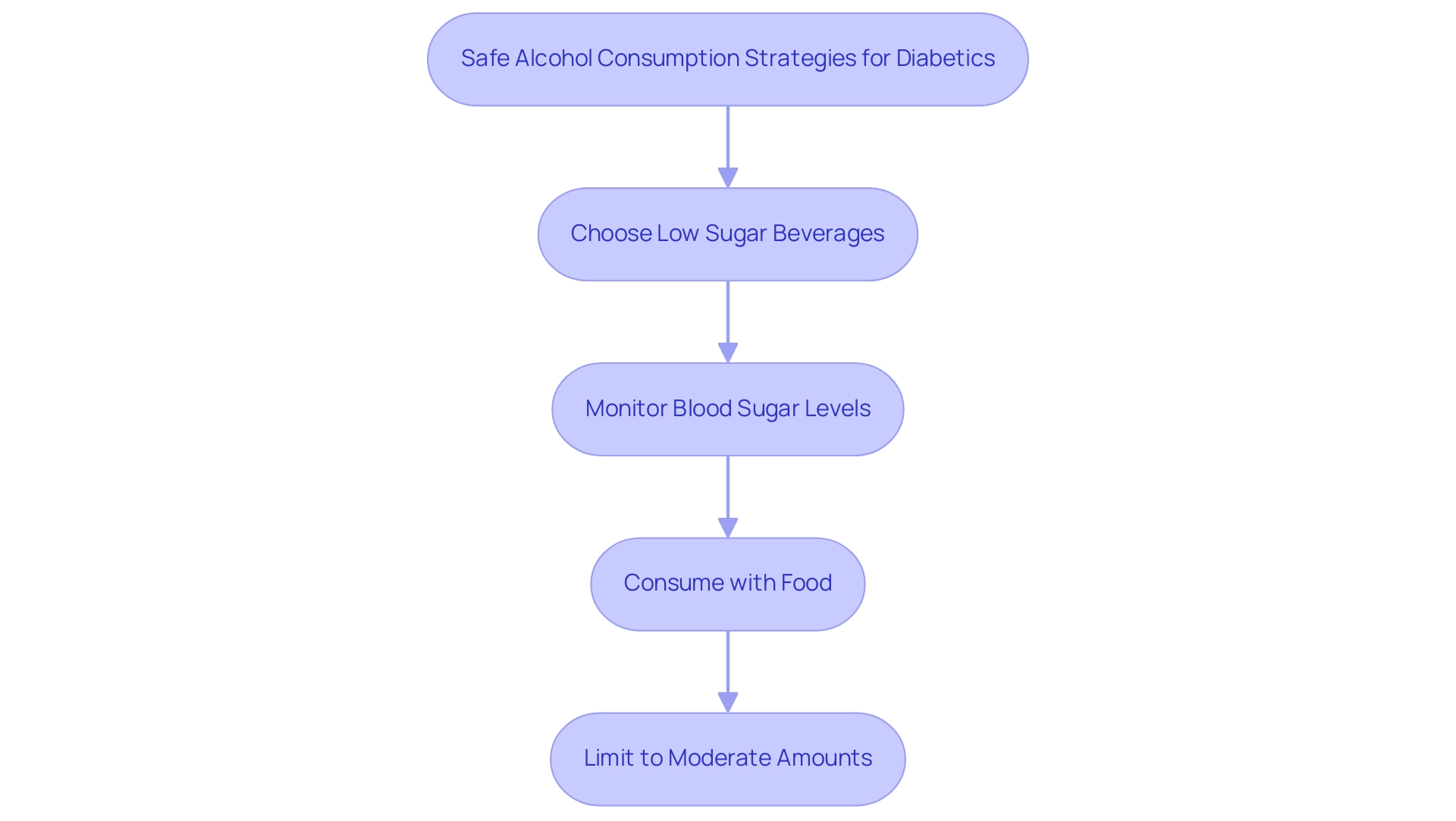
Health Risks of Alcohol Consumption for Diabetic Individuals
As T2DSolutions establishes itself as a new resource center for Type 2 and Type 3 health education and community assistance, it is crucial to recognize the substantial health dangers linked to drinking for alcoholics with diabetes who are managing blood sugar levels. One of the primary concerns is the increased likelihood of hypoglycemia, which can occur when beverages affect blood sugar levels, particularly when consumed without food. A recent meta-analysis highlights the intricate connection between average daily beverage intake and the risk of developing type 2 conditions, showing that while light to moderate drinking may be linked to a reduced risk, the possibility of hypoglycemia in individuals with glucose regulation issues continues to be an important consideration.
S. Goya Wannamethee, PhD, observes that 'the finding that light to moderate drinking is linked to a reduced risk of type 2 metabolic disorder is biologically plausible,' yet this must be balanced against the inherent risks for those already managing the condition.
Furthermore, beverage intake can result in weight increase and heightened triglyceride levels, both of which worsen complications associated with blood sugar issues. In fact, beverages containing ethanol have been suggested as another risk factor for diabetic retinopathy, as reported in the British Medical Journal (1984;288:1035–1037), highlighting its potential long-term effects on eye health. It also has the potential to interfere with the effectiveness of blood sugar medications, resulting in poor glycemic control, which can increase the risk of long-term complications, including neuropathy and cardiovascular disease.
The management of this condition may involve insulin injections or drugs that promote insulin production or reduce insulin resistance, with some medications possibly leading to hypoglycemia, further complicating the control of this health issue in relation to beverage intake. Real-world events have shown how hypoglycemia can occur in diabetic people after drinking, further highlighting the necessity for careful consideration of drinking habits. Considering these findings, it is essential for individuals overseeing blood sugar management to thoroughly evaluate their drinking habits to reduce health risks effectively.
T2DSolutions strives to offer resources, professional insights, and community assistance to aid people in navigating these challenges and making informed choices related to beverage consumption as part of their health management. As T2DSolutions evolves, it will keep offering valuable insights and continuous research into the intricate relationships between beverage consumption and blood sugar management.
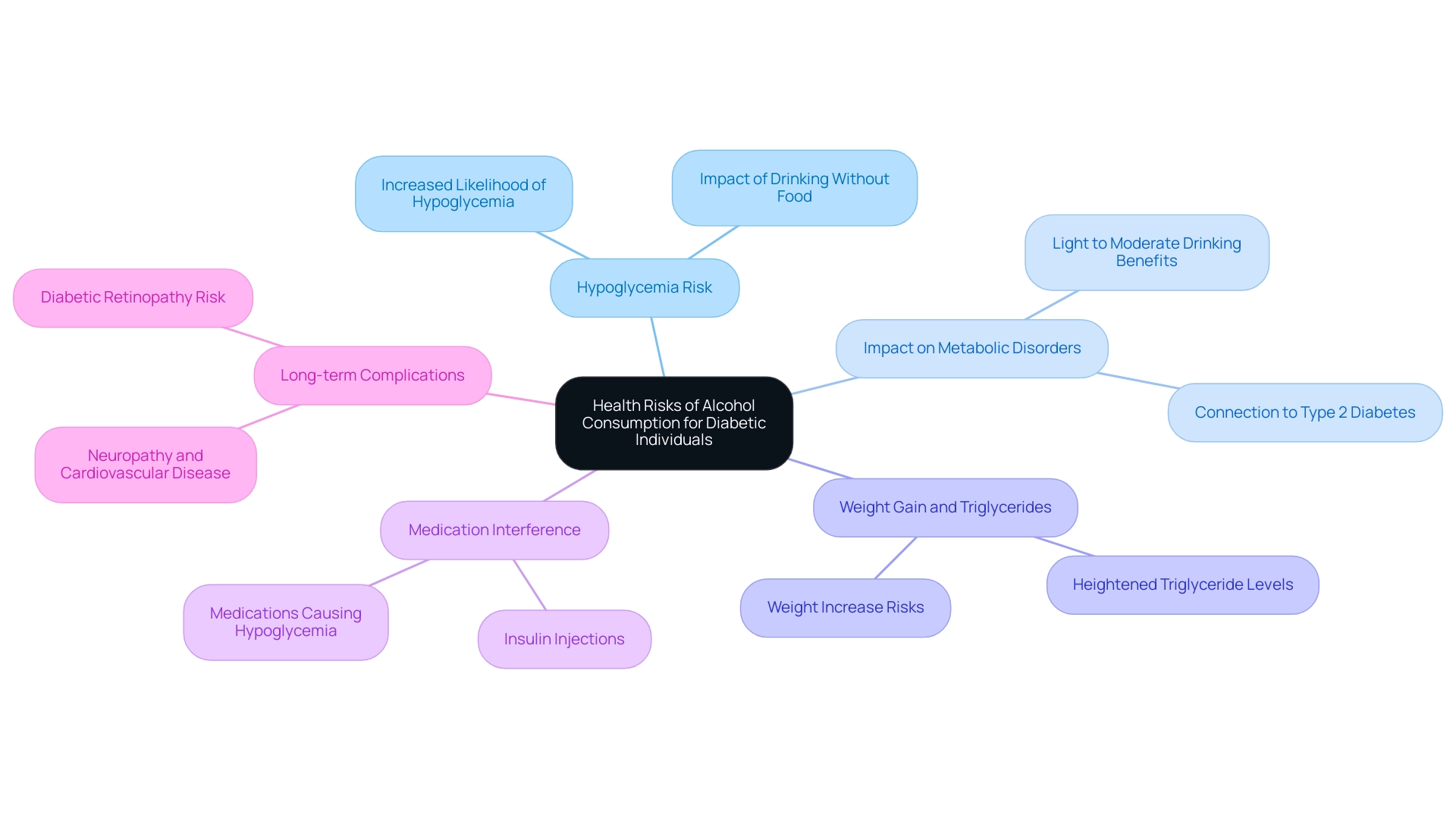
Lifestyle Modifications for Diabetics Who Consume Alcohol
For alcoholics with diabetes who decide to drink, adopting various lifestyle changes is crucial for successful management. Engaging in regular physical activity has been shown to counterbalance the effects of beverages on blood sugar levels, as exercise significantly enhances insulin sensitivity. Recent data from a comprehensive analysis of 477,200 individuals, which included 12,556 new cases of blood sugar disorders, underscores the importance of maintaining an active lifestyle.
Additionally, adhering to a balanced diet that emphasizes fiber, lean proteins, and healthy fats is crucial for stabilizing blood sugar levels. Maintaining a comprehensive food and beverage log can enhance awareness of beverage consumption and its particular impacts on blood sugar management. Furthermore, participation in support groups or counseling offers valuable resources for making informed lifestyle choices.
T2DSolutions seeks to offer recently diagnosed individuals access to educational resources and community assistance, including insights on managing beverage intake effectively. As highlighted in a U.S. study by Wei (2000), which explored the connection between beverage intake and health diagnosis among 8,633 participants, lifestyle modifications play a crucial role in alleviating related issues. The research discovered that drinking behaviors can affect diabetes results, particularly in alcoholics with diabetes, emphasizing the significance of moderation.
Significantly, 25% of people reported intake of 1 or more beverages daily, highlighting the prevalence of this behavior among alcoholics with diabetes. By prioritizing these modifications and utilizing the resources available through T2DSolutions, alcoholics with diabetes can better navigate the complexities of beverage consumption while maintaining optimal health.
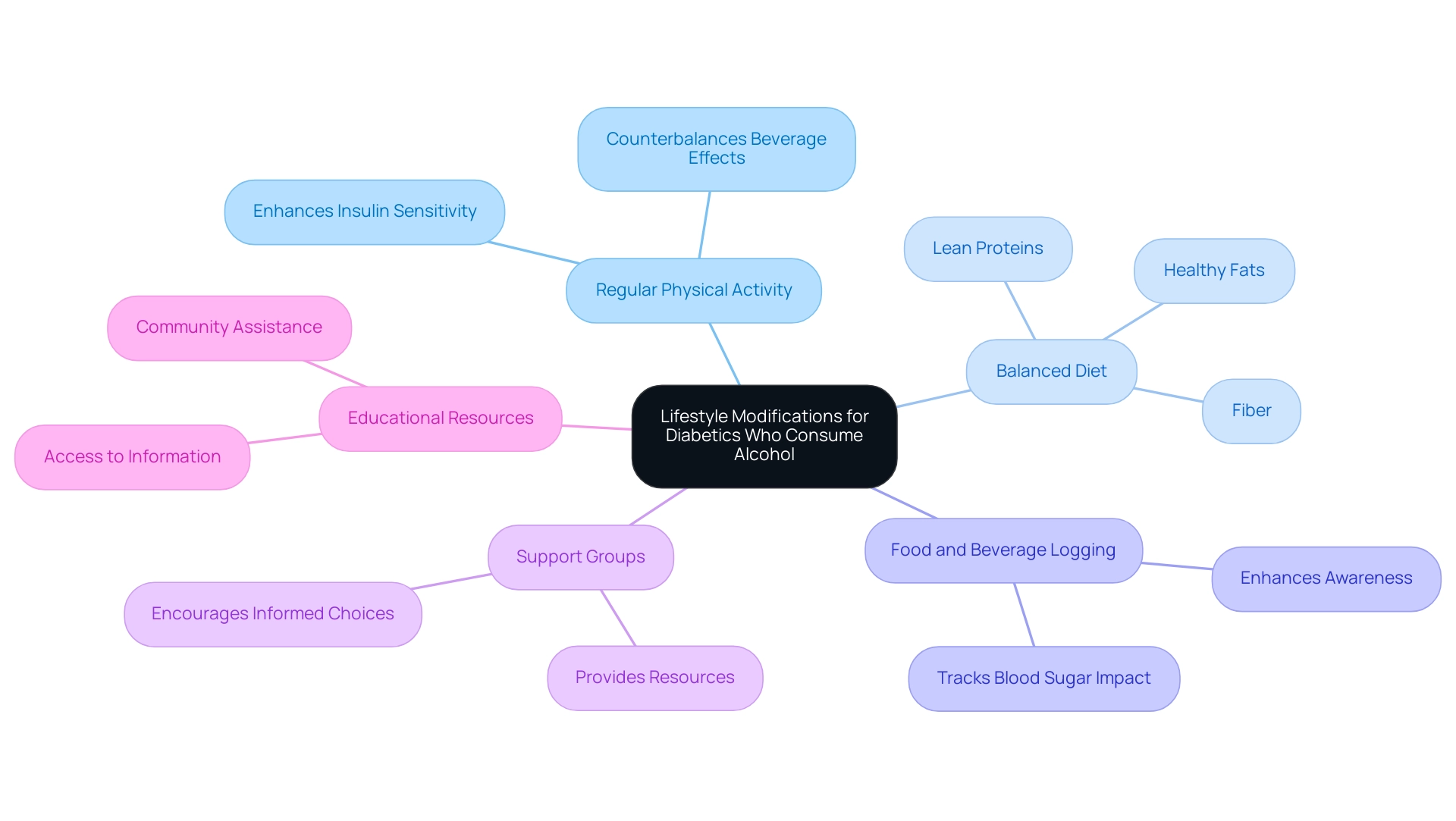
The Importance of Education and Awareness in Alcohol and Diabetes Management
Education and awareness about the impact of beverages on blood sugar management are essential for individuals living with this condition. T2DSolutions, your new comprehensive resource for Type 2 and Type 3 blood sugar management education and community support, emphasizes the importance of regular consultations with healthcare professionals. These consultations enable alcoholics with diabetes to remain informed about their health status and the implications of alcohol consumption on glycemic control.
Research indicates that self-management education (DSME) can significantly enhance knowledge, behavior, and self-efficacy among type 2 patients. A systematic review conducted by Sugiyama et al. (2015), involving 516 participants, revealed that individuals who received DSME were better equipped to manage their condition effectively.
Notably, only 10% of those who had never received diabetes education adhered to at least 9 of the 10 recommended self-care practices, underscoring the critical role of education in diabetes management. T2DSolutions offers workshops and informational resources that play a vital role in providing valuable insights into safer alcohol consumption choices for alcoholics with diabetes. Understanding individual health effects, recognizing personal limits, and staying abreast of new research can empower diabetics to take ownership of their health.
As Cunningham noted, while DSME may not significantly affect HbA1c levels, it positively influences overall self-management behaviors. Furthermore, case studies, such as the 'Effect of a Community-Based Diabetes Self-Management Empowerment Program on Mental Health-Related Quality of Life,' highlight that community-based diabetes self-management programs can improve mental health-related quality of life, emphasizing the comprehensive benefits of educational initiatives. T2DSolutions invites you to subscribe for updates and stay informed as we launch this new platform dedicated to supporting newly diagnosed patients.
Ultimately, education leads to enhanced self-management and improved health outcomes for alcoholics with diabetes as they navigate the complexities of alcohol consumption.
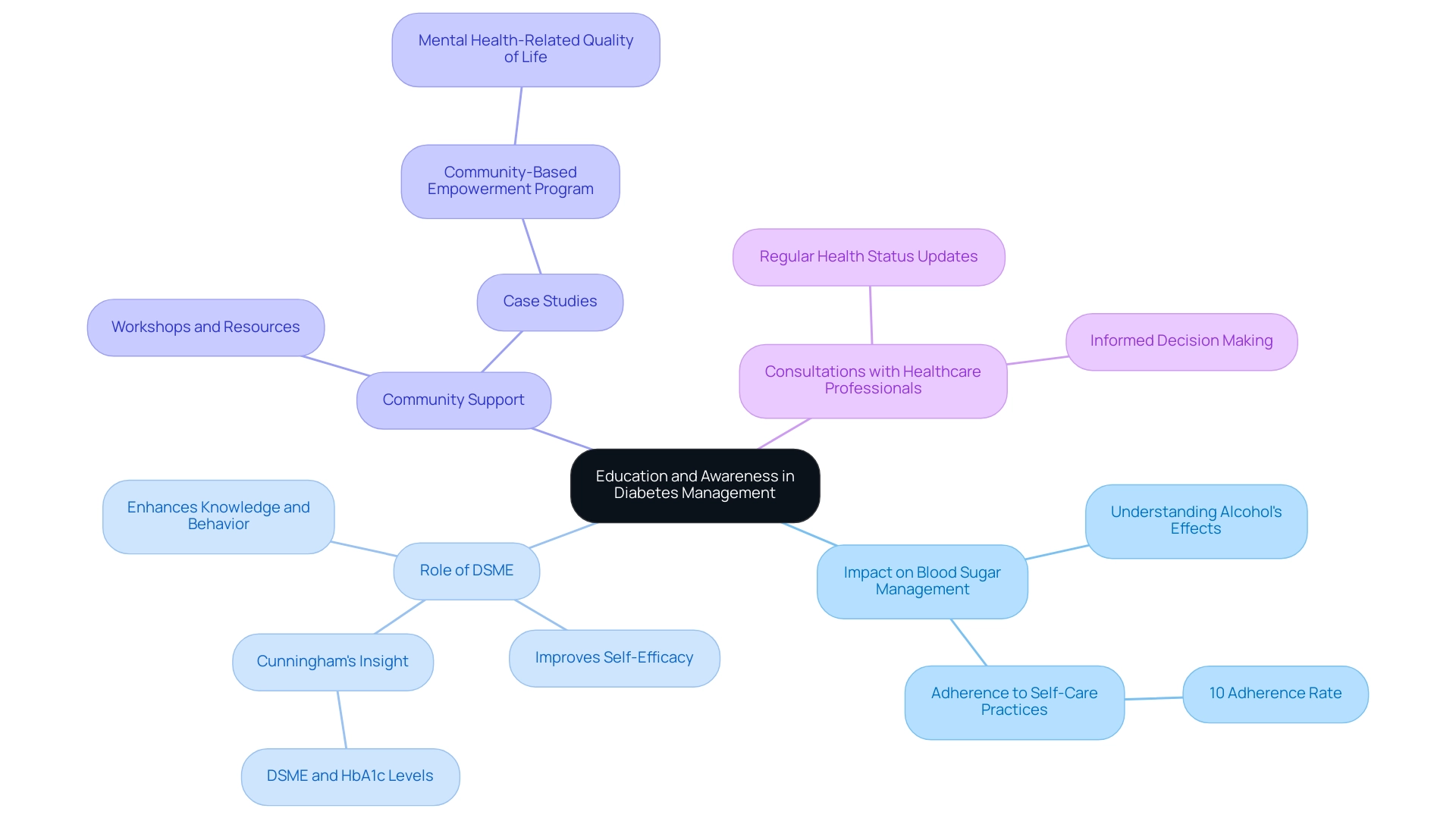
Conclusion
Understanding the intricate relationship between alcohol and diabetes is essential for effective diabetes management. Alcohol can significantly impact blood sugar levels, leading to potential risks such as hypoglycemia, particularly for those on insulin or certain medications. Recognizing the importance of moderation and the type of alcoholic beverages consumed is crucial. Strategies such as:
- Pairing alcohol with food
- Monitoring blood sugar levels
- Opting for lower-sugar options
can help mitigate these risks.
Moreover, lifestyle modifications play a vital role in managing diabetes for those who choose to drink. Regular physical activity and a balanced diet are key components that can counteract the effects of alcohol on glucose control. Keeping a detailed record of food and drink intake can enhance awareness and support better decision-making regarding alcohol consumption.
Education and awareness are paramount in navigating the complexities of alcohol and diabetes. Regular consultations with healthcare professionals and participation in diabetes self-management education can empower individuals to make informed choices. As resources like T2DSolutions emerge to provide essential support and guidance, individuals with diabetes can better manage their health while enjoying social occasions. Ultimately, informed decision-making and proactive management are the cornerstones of achieving optimal health outcomes for those living with diabetes.



